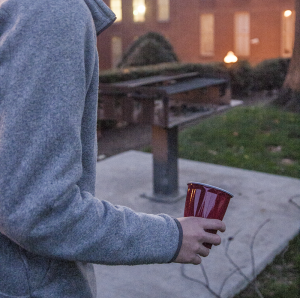
The university’s expansion of the open container policy, which now includes locations such as Alumni Square, has been met with success.
After the Outdoor Student Living Pilot Program expanded to allow students to drink wine and beer in more outdoor locations on campus in August, the Georgetown University Police Department and the Office of Residential Living have cited minimal problems, touting the program as a success.
This fall, the program expanded to allow students who are 21 or older to drink in designated outdoor areas around Nevils, LXR, the Leavey Esplanade and the Alumni Square Courtyard. The pilot program began in August 2013, allowing students of legal age to drink wine and beer outdoors in areas of Henle Village and Village A.
Vice President for Student Affairs Todd Olson said that the program has proven to be successful in its early months, with few complaints registered to GUPD.
“We have a set of policies around alcohol use and social life that are designed to respect the law, keep students safe and healthy and encourage student social life on campus,” Olson wrote in an email. “The notable policy change related to open containers provides a setting for small outdoor gatherings with alcohol in some residential areas on campus. I am encouraged by the collaborative work on that, and by the early success of that initiative.”
Director of Student Conduct Judy Johnson said she hopes that granting this new freedom to students will encourage them to behave appropriately to ensure student safety.
“The hope is that when allowing open containers in a specific area, students will behave in an orderly manner and abide by the policies,” Johnson said. “I think we are always open to the idea of discussing what would be helpful for students to feel relaxed and maintain a good social life on campus. We want to balance the idea of relaxation and social life on campus with what abides by the law and respects our neighbors.”
Johnson said that although the program has been successful thus far, she fears that students may misunderstand the policy in the upcoming months.
“The difficulty comes when students may not realize that these are specified areas and travelling from one area to the next may cause students confusion,” Johnson said. “The identified areas pertain only to students who are 21 and older, and applies just to those areas, not for a student to go from [his or her] room to that space with an open container. It is confusing for students and I worry about students feeling misunderstood.”
According to Johnson, the open beverage policy on the Leavey Esplanade could prove to be a risk to student safety.
“The Leavey Esplanade will be more difficult to monitor for student safety,” Johnson said. “I can see that there would be difficulties there because many different people can access that and it is not immediately accessible from a residence hall. The coming and going could be very problematic.”
GUSA President Trevor Tezel (SFS ’15) and Vice President Omika Jikaria (SFS ’15) worked with GUPD and the Office of Residential Living to expand the pilot program. Tezel said that this initiative is part of GUSA’s larger goal to create a more vibrant on-campus social life.
“If we want to truly create the residential campus that the university is aiming for, then we need to re-examine all of our social policies, including ones related to outdoor gatherings,” Tezel said.
According to Tezel, the success of the program has proven the responsibility of Georgetown students.
“Will it become an issue if there are a group of 30 students packed into the Henle courtyard throwing a party? Yes,” Tezel said. “But with the pilot program, we haven’t seen that. Georgetown students have shown they’re responsible drinkers.”
Although the policy is already in effect, GUPD continues to monitor the implementation of the policy with Residential Education in the Office of Residential Living. Tezel and Jikaria said that they are confident that students will continue to behave in accordance with the new policies.
“I think policy changes like this will put responsibility on Georgetown students for their own drinking habits and educate them on being smart about alcohol consumption,” Jikaria said. “That being said, we are constantly seeking feedback from students on this change and want to ensure that other students’ quality of life is not being adversely affected.”
Village A resident Jason Gusdorf (SFS ’16) said that although the pilot program contributes to high levels of noise, it is important for student life at Georgetown.
“Extending the open container policy lets students who are legally able to drink have more freedom in terms of the spaces they can be in, which is clearly something that is much needed,” Gusdorf said. “Of course living on a rooftop in Village A implies that there is going to be a high level of noise and a certain amount of partying, but I understood that when I signed up to live here, and it’s important for students to have these areas for social gatherings.”




















